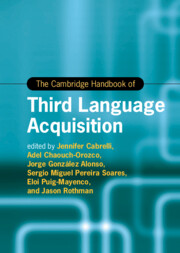Book contents
- The Cambridge Handbook of Third Language Acquisition
- Cambridge Handbooks in Language and Linguistics
- The Cambridge Handbook of Third Language Acquisition
- Copyright page
- Contents
- Figures
- Tables
- Contributors
- Introduction Multilingualism
- Part I Theoretical Approaches to L3/Ln
- Part II L3/Ln across Linguistic Domains
- 5 Exploring the Acquisition of L3 Phonology
- 6 Characteristics of the L3 Lexicon
- 7 Processing Words in a Multilingual Lexicon
- 8 Full Transfer in L3/Ln Acquisition
- 9 Full Transfer Potential in L3/Ln Acquisition
- 10 The Acquisition and Processing of Pragmatics in Multilinguals and Third Language Learners
- Part III Becoming and Staying Multilingual at Different Ages
- Part IV L3/Ln in Action
- Part V L3/Ln and Cognition
- Part VI Research Methods in L3/Ln
- Index
- References
7 - Processing Words in a Multilingual Lexicon
from Part II - L3/Ln across Linguistic Domains
Published online by Cambridge University Press: 13 July 2023
- The Cambridge Handbook of Third Language Acquisition
- Cambridge Handbooks in Language and Linguistics
- The Cambridge Handbook of Third Language Acquisition
- Copyright page
- Contents
- Figures
- Tables
- Contributors
- Introduction Multilingualism
- Part I Theoretical Approaches to L3/Ln
- Part II L3/Ln across Linguistic Domains
- 5 Exploring the Acquisition of L3 Phonology
- 6 Characteristics of the L3 Lexicon
- 7 Processing Words in a Multilingual Lexicon
- 8 Full Transfer in L3/Ln Acquisition
- 9 Full Transfer Potential in L3/Ln Acquisition
- 10 The Acquisition and Processing of Pragmatics in Multilinguals and Third Language Learners
- Part III Becoming and Staying Multilingual at Different Ages
- Part IV L3/Ln in Action
- Part V L3/Ln and Cognition
- Part VI Research Methods in L3/Ln
- Index
- References
Summary
Multilinguals are impressive masters of flexibility. They can speak in only one language at a time without any apparent trouble, but also switch their languages easily if necessary. This apparent paradox has led researchers to ask whether multilinguals’ knowledge of their languages – such as the knowledge of words – is stored and accessed separately or together. This chapter summarizes what we currently know about the structure and workings of the tri- and multilingual lexicon, reviewing findings for word recognition, word production, and translation, as well as evidence from neurocognitive studies. It shows that the answer to the question how the trilingual mental lexicon is organized is not a simple, black-or-white one (i.e., ‘integrated’ or ‘separate’). Rather, the available evidence supports a nuanced view of trilingual word processing that is co-determined by characteristics of the individual and their acquisition history, the properties of the involved languages, and the nature of the task.
Information
- Type
- Chapter
- Information
- The Cambridge Handbook of Third Language Acquisition , pp. 165 - 194Publisher: Cambridge University PressPrint publication year: 2023
References
Accessibility standard: Unknown
- 2
- Cited by
